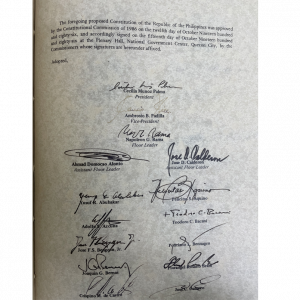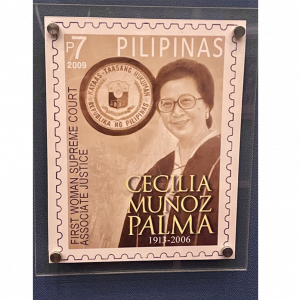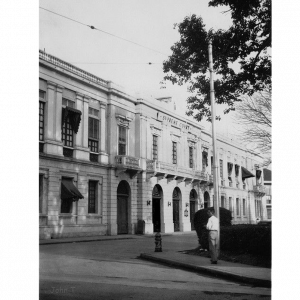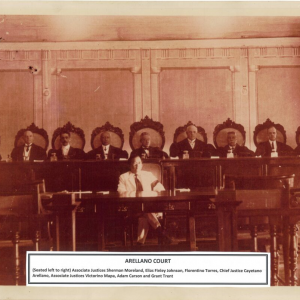SC to Recruitment Agencies: Be advocates of OFWs
February 08, 2022
Championing the rights of overseas Filipino workers (OFWs), the Supreme Court has cautioned recruitment agencies to be advocates for Filipino migrant workers as it reminded them anew of their important role in protecting the interests and welfare of OFWs.
This reminder was explicitly stated in a 29-page Decision, penned by no less than Chief Justice Alexander G. Gesmundo, which ordered a recruitment agency and its foreign principal to pay the surviving heirs of a former OFW in Taiwan who was illegally dismissed and repatriated after he was found suffering from end stage renal disease.
“Overseas Filipino workers who are contractually and legally entitled to receive health insurance benefits may not be denied of their rights privileges under the law, notwithstanding the termination of their employment, or the lack of proof that the illness contracted is work- connected. Corollary thereto, Department of Labor and Employment (DOLE)-accredited recruitment agencies must ensure that their foreign principals comply with this obligation, consistent with their responsibility to protect the interest of distressed migrant workers. Failure to do so constitutes gross neglect and bad faith which render these recruitment agencies solidarily liable with their foreign principals,” the Court said.
The Court lamented that despite enactment in 1995 of R.A. No. 8042 (Migrant Workers and Overseas Filipinos Act of 1995) and numerous jurisprudential rulings imposing damages against negligent recruitment agencies, these agencies and their foreign principals refuse to take heed of the Court’s constant reminder to ensure the welfare of migrant workers. It noted that the cases that have reached the Court, including the case at bar, involve incidents of oppression, inhuman treatment, and deception of OFWs by giving them less than what they are contractually or legally entitled to.
Hence, the Court stressed the “need for a stricter enforcement of the law and rules and regulations pertaining to Filipino contract workers abroad.”
“The important role of recruitment agencies in the protection of the interests and welfare of Filipino workers abroad cannot be overemphasized. They should first and foremost be the advocate of Filipino migrant workers, especially in the enforcement of contracts of employments and labor laws and rules and regulations, and shot not let themselves be instruments of oppression,” the Court said.
In the case at bar, the Court affirmed with modification the October 26, 2016 Decision and January 13, 2017 Resolution of the Court of Appeals (CA), in that petitioners Jerzon Manpower and Trading, Inc. (Jerzon), United Taiwan Corporation (UTC), and Clifford Uy Tuazon, are hereby ordered to pay the heirs of respondent Emmanuel B. Nato, jointly and solidarily, the equivalent of NT$102,528.00 in Philippine Peso at the
time of payment, as respondent’s pay for the unexpired portion of his employment contract, plus damages and legal interest.
Emmanuel, who had already passed away and was substituted by his surviving spouse Lorna A. Nato, was hired in 2008 as machine operator by Jerzon, for and behalf of its foreign principal UTC. Tuazon is president of Jerzon. Emmanuel’s employment contract had a duration of one year, seven months, and seven days with a monthly wage of NT$17,280.
As a machine operator, Emmanuel was responsible for monitoring machines, operating the machine control system, and doing minor repairs. He was constantly exposed to a hot working environment because of the vapors and emission from the machines, which he monitored and operated daily for eight to 12 hours.
About a year after his deployment, Emmanuel started to experience occasional stomachaches. He informed his superior when the pain constantly recurred but the former ignored his complaint. He continued to report for work despite feeling weak, having severe stomach pains and vomiting regularly. Eventually, Emmanuel’s co-worker took him to a hospital for checkup where he was diagnosed with ulcer. His condition continued to worse and he was again brought to the hospital where he learned that he had an end-state chronic kidney disease. He was confined and had daily dialysis for 10 days.
In July 2009, Emmanuel was sent back to the country. Upon his arrival, he was immediately brought to the hospital from the airport due to the seriousness of his illness. No one from petitioners’ office fetched him from the airport or even inquired about his condition while he was hospitalized.
In June 2012, he filed before the Labor Arbiter (LA) a complaint against Jerzon, UTC, and Tuazon for payment of disability and medical benefits, hospitalization expenses, airline ticket, and salary for the unexpired portion of his contract. He claimed that petitioners should have allowed him to recover before being repatriated to the Philippines since he had health care and labor insurance benefits under his employment contract. Petitioners failed to file their position paper despite an earlier request for extension to submit said pleading to the LA.
The LA held that Nato contracted his illness during the term of his employment. It awarded his unpaid salaries for three months and P1M financial assistance. Petitioners appealed to National Labor Relations Commission (NLRC), which set aside the LA’s Decision and, in 2013, instead only awarded P100,000 financial assistance to the surviving heirs.
On appeal, the CA reinstated the LA’s ruling. Aggrieved, the petitioners elevated the case to the SC.
The High Court held that the Emmanuel was terminated without just or authorized cause. Contrary to claims of petitioners, the Court held that it were them who terminated the employment. As his repatriation came immediately after his confinement and dialysis treatments in Taiwan, it can be reasonably concluded that petitioners’ cause for terminating his employment was respondent’s illness.
The Court held that petitioners failed to comply with the twin-notice requirement and simply repatriated respondent back to the Philippines without any kind of assistance. After his dialysis session for 10 consecutive days in Taiwan, respondent’s broker brought him to the airport without any explanation as to his abrupt repatriation, despite his condition. It noted that UTC did not even reach out to him while he was at the hospital to tell him of his intention to terminate his employment, much less send a written notice to apprise him of the ground for his termination and to inform him of his eventual dismissal.
Respondent’s employment was terminated without authorized cause and without observance of procedural due process. Under Sec. 10 of RA No. 8042 as amended, he is entitled to full reimbursement of his placement fee with interest of 12% per annum, plus his salaries for the unexpired portion of his employment contract. However, respondent, failed to prove the amount he had paid as placement fee since the same was not substantiated by any evidence on record.
(G.R. No. 230211, Jerzon Manpower and Trading, Inc., et al. v. Nato and CA, October 6, 2021)
FULL TEXT: https://sc.judiciary.gov.ph/24123/












